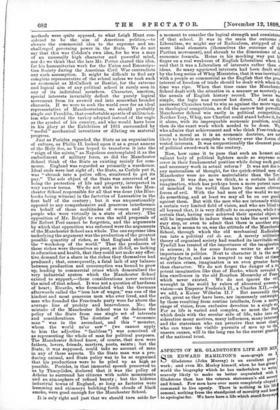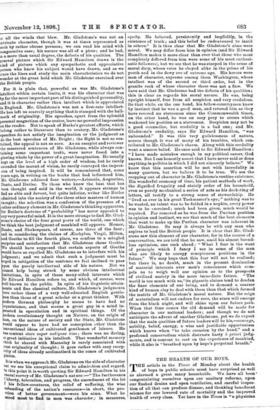ASPECTS OF MR. GLADSTONE'S LIFE AND 11 Q IR EDWARD
HAMILTON'S monograph on Gladstone (John Murray) is an excellent piece work ; and even Mr. Morley himself, when he has give5 world the biography which he has undertaken to writ4 scarcely likely to make us better acquainted with Gladstone than has the veteran statesman's old secre and friend. Few men have ever more completely obe7ed. command to live openly. There is nothing in his life conceal, nothing from the standpoint of morality and hos to apologise for. We have here a life which stood four-eq 4 all the winds that blew. Mr. Gladstone's was not an .ntricate character, though it was at times represented as inch by rather obtuse persons; we can read his mind with ;orgparative ease; his nature was all of a piece ; and he had, n a more than usual degree, the defects of his qualities. The general picture which Sir Edward Hamilton draws is the kind of picture which any sympathetic and appreciative person who knew his subject would have drawn, and as we trace the lines and study the main characteristics we do not wonder at the great hold which Mr. Gladstone exercised over the British people.
For it is plain that, powerful as was Mr. Gladstone's intellect within certain limits, it was his character that was by far the most important part of his distinguished personality, and it is character rather than intellect which is appreciated in England. Mr. Gladstone's was not a first-rate intellect- He has left us scarcely anything that is stamped with the hall- mark of originality. His speeches, apart from the splendid personal magnetism of the orator, leave no powerful impression on the reader. Not to speak of Burke's greatest efforts, which belong rather to literature than to oratory, Mr. Gladstone's speeches do not satisfy the imagination or the judgment as do the best speeches of Mr. Bright ; the flight is not so sus- tained, the appeal is not so sure. As an essayist and reviewer the measured sentences of Mr. Gladstone, while always con- taining some important truth!, were never fused into a glowing whole by the power of a great imagination. He usually kept on the level of a high order of wisdom, but he rarely ascended the mount of vision, he rarely conveyed the impres- ion of being inspired. It will be remembered that, some years ago, in writing on the books that had influenced him, Mr. Gladstone adduced four writers,—Aristotle, Augustine, Dante, and Butler. To those who know the best that has been thought and said in the world, it appears strange to find an able and devout, but quite inferior, writer like Butler admitted into the society of the three other masters of human thought ; the selection was a confession of the presence of a rather ordinary element in Mr. Gladstone's thinking apparatus, for Butler's doctrine of " probability " has never appealed to any very powerful mind. It is the more strange to find Mr. Glad- stone's choice of the four great poets of the world, one which we think the best judgment of mankind will approve. Homer, Dante, and Shakespeare, of course, are three of the four ; and in considering the claims of 2Eschylus, Virgil, Milton, and Goethe to fill the fourth place, we confess to a mingled surprise and satisfaction that Mr. Gladstone chose Goethe.
e should have supposed that certain aspects of Goethe ould have so repelled Mr. Gladstone as to interfere with his 'udgment; and we admit that such a judgment must be rged in mitigation of the sentence we feel inclined to pass pon the purely intellectual side of his nature. But we annot help being struck by some obvious intellectual • mitations, in spite of those many-sided interests which r Edward Hamilton refers to, and which, of course, were ell known to the public. In spite of his linguistic attain- ents and fine classical culture, Mr. Gladstone's judgments ere rather those of a very well-educated English gentle- an than those of a great scholar or a great thinker. With odern German philosophy be seems to have had no equaintance, and that means a great gap in a mind in- rested in apeculation and in spiritual things. Of the odern revolutionary thought on Nature, on the origin of an, on the nature of society and the State, Mr. Gladstone cold appear to have had no conception other than the mnventional ideas of cultivated gentlemen of leisure. He Ms content stare super antiquas vias ; there was no daring, 0 great initiative in his intellect. That wonderful memory thich he shared with Macaulay is rarely associated with ■ rest originality of thought ; it goes rather with easy recep- ivity of ideas already acclimatised in the zones of cultivated his when we approach Mr. Gladstone on the aide of character hat we see his exceptional claim to admiration and regard. M this point it is worth quoting Sir Edward Hamilton in his eneral survey of Mr. Gladstone's nature :—" The furtherance liberty, toleration, and progress, the amendment of the lot his fellow-creatures, the relief of suffering, the wise usbanding of the nation's resources—in short, the pro- otion of better government—were his aims. What he *red most to find in men was character; in measures,
equity. He believed, persistently and implicitly, in the existence of truth ; and this belief he endeavoured to instil in others." It is thus clear that Mr. Gladstone's aims were moral. We may differ from him in opinion (and Sir Edward Hamilton makes it more clear than ever that those who most completely differed from him were some of his most enthusi- astic followers), but we see that he was steeped in the sense of moral duty, whose voice he obeyed alike in the prime of his youth and in the dewy eve of extreme age. His heroes were men of character, supreme among them Washington, whose intellect was of the second or third order, but in the granite rock of whose character there was not a flaw. We have said that Mr. Gladstone had the defects of his qualities ; this is clear as regards his moral nature. He was, being upright himself, free from all suspicion and very credulous. So that while, on the one hand, his fellow-countrymen knew by instinct that he was a good man, and revered him as they have revered no statesman since the Commonwealth times, on the other hand, he was an easy prey to errors which weakened his position as a statesman. Suspicion may not be a good counsellor, but credulity is a bad one ; and Mr. Gladstone's credulity, says Sir Edward Hamilton, "was unbounded." It was this very guilelessness of nature, source though it was of many of his troubles, which con- tributed to Mr. Gladstone's charm. Along with this credulity went a sincere belief. He once said to Sir Edward Hamilton : "I have made mistakes enough in my political career, God knows. But I can honestly assert that I have never said or done anything in politics in which I did not sincerely believe." We know that this assertion will be met with incredulity in many quarters, but we believe it to be true. We see the cropping out of character in Mr. Gladstone's routine existence. His wonderful economy of time, his patient methods of work, the dignified frugality and stately order of his household, even so purely mechanical a series of acts as his docketing of letters, all testify to a strong sense of stewardship. He "lived as ever in his great Taskmaster's eye ; " nothing was to be wasted, no talent was to be folded in a napkin, every power was to be exercised ; much had been given, much would be required. Far removed as he was from the Puritan position in opinion and instinct, we see that much of the best elements that went to make up the Puritan character was inherent in Mr. Gladstone. So may it always be with any man who aspires to lead the British people. It is clear that Mr. Glad- stone saw this element of our character, for in the course of a conversation, we are told that he saw, amid his almost bound- less optimism, one rock ahead : What I fear is the want of principle which I fancy I see in some of the men who are likely to occupy conspicuous positions in the future." We may hope that this fear will not be realised; but there is, no doubt, much in the present domination of material interests over men's consciences which com- pels us to weigh well our opinion as to the prospects of civilised society in the more immediate future. "The world is too much with us," its gigantic claims tend to deaden the finer elements of our being, and to demand a coarser kind of human clay to deal with them than that which formed the matrix of Mr. Gladstone's moral nature. But the reign of materialism will not endure for ever, the stars will emerge from the black night, and will shine upon our future path. When that time comes the old demand will be made for character in our national leaders ; and though we do not anticipate the advent of another Gladstone, yet we do expect that the main qualities of future leaders will be his,—courage, nobility, belief, energy, a wise and justifiable opportunism which knows when "to take occasion by the hand," and a profound conservatism which distrusts hasty a priori judg- ments, and is content to rest on the experience of mankind, while it also is "breathed upon by hope's perpetual breath."







































 Previous page
Previous page